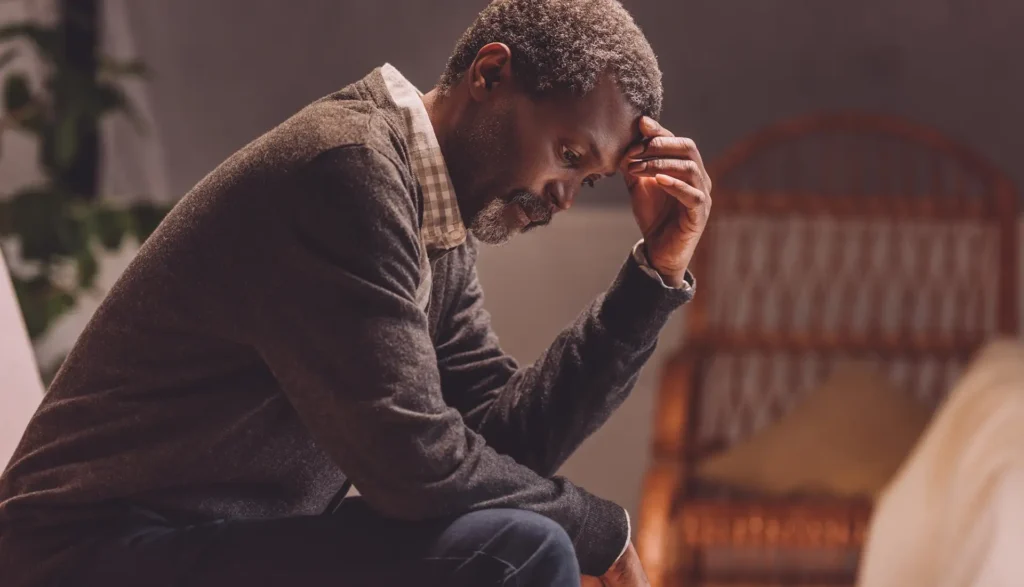Wondering how to help a friend with depression? This article will provide you with clear, actionable steps to support them. We will cover everything from recognizing the signs of depression to starting a conversation, and encouraging professional help.
Key Takeaways
- Recognizing the symptoms of depression is crucial for timely intervention and support.
- Encouraging open conversations and promoting professional help are essential strategies for assisting a friend with depression.
- Offering practical and emotional support, while also taking care of one’s own mental health, is vital in maintaining a healthy nurturing relationship.
Recognize the Symptoms of Depression
Identifying depression symptoms in a friend allows for timely and effective intervention. Clinical depression and major depressive disorder often manifest as a prolonged state of sadness, hopelessness, and a lack of interest in activities that were once enjoyed. These symptoms can be subtle at first, gradually intensifying over time, which can make it challenging to identify the onset of the condition.
Physical symptoms are also common. Changes in appetite, whether it’s reduced or increased, significant weight changes, fatigue, and sleep disturbances are all physical indicators of depression. These symptoms may make your friend less energetic and more withdrawn, affecting their daily routines and social interactions.
You might also notice social behavior changes, such as withdrawal from friends and reduced engagement in social activities. Depression affects every aspect of a person’s life, including their ability to concentrate and make decisions, often leading to a decline in performance at work or school. Recognizing these warning signs is the first step in providing the support your friend needs.
Start a Conversation
Starting a conversation about depression can be daunting, but it’s a critical step in providing support. Expressing genuine concern and inviting your friend to share their feelings can open a supportive dialogue. Listen carefully, providing your full attention without judgment. This shows your friend that their feelings are valid and that they are not alone.
Communicating hope by reassuring them that their struggles are not unique and that help is available can be tremendously beneficial. Sometimes, engaging in shared activities like going for a walk can create a more comfortable setting for discussing their feelings. This can make the conversation feel less forced and more natural.
Setting boundaries ensures that you do not become overwhelmed while providing support. Understanding your limits and communicating them clearly can prevent burnout and maintain a healthy relationship with your friend.
Encourage Professional Help
Encouraging a friend to seek professional help is often necessary for their recovery, though it can be a delicate task. Mental health care professional are trained to treat depression and can offer the best treatment options tailored to individual needs. However, many people find it difficult to see the need for help or feel a stigma attached to seeking therapy.
You can assist by helping your friend explore their feelings about therapy and addressing any concerns they may have about the stigma surrounding mental health. Providing practical support, such as helping them find a therapist through resources like the National Institute of Mental Health (NIMH) website or SAMHSA’s online tool, can make the process less daunting.
If your friend is hesitant, offer to help with practical steps like scheduling their first appointment or preparing questions they might want to ask during their session. This can alleviate some of the anxiety associated with seeking professional help and show your friend that they have your unwavering support.

Support Them in Continuing Treatment
Supporting a friend in continuing their treatment is crucial for their recovery. There is no clear timeline for recovery from depression, and treatment often involves trial and error. Your understanding and patience can make a significant difference in their journey.
Encourage your friend to stick with their therapy appointments, even when they feel like canceling. Reminders about upcoming sessions can help them stay committed to their treatment plan. If they express a desire to stop taking prescribed medications due to side effects, gently encourage them to discuss this with their psychiatrist rather than stopping abruptly, which can have serious consequences.
Offering to accompany them to appointments or attending family therapy sessions can also provide emotional and social support. This involvement shows your friend that you are there for them every step of the way, reinforcing the importance of their treatment. If your friend is considering a more structured treatment option, suggest exploring a depression IOP in Boston. Intensive Outpatient Programs (IOP) offer a higher level of care without the need for full hospitalization, providing a supportive environment for recovery. Your willingness to assist them in finding and attending these programs can demonstrate your commitment to their well-being.
Offer Practical Assistance
Depression affects brain areas that control task completion and motivation, making daily activities seem insurmountable and often leading to trouble concentrating. Offering practical assistance can alleviate some of this burden. Tasks like laundry, grocery shopping, and paying bills can be overwhelming for someone with major depression.
You can offer to help with specific tasks, such as preparing meals or running errands, to lessen the stress of daily responsibilities. Sometimes, just having company while doing household chores can make these tasks seem less daunting.
Suggesting specific tasks rather than asking open-ended questions about how to help can be more effective. For example, saying, “I can pick up groceries for you this week,” provides clear and actionable support. Small gestures like these can make a world of difference for someone experiencing depression.
Be Aware of Suicide Risk
Being aware of suicide risk people is a critical aspect of supporting a friend with depression. Severe depression is associated with an increased risk of suicide, making it essential to recognize warning signs. These signs can include mentioning suicidal thoughts or having a plan for self-harm.
If you notice these signs, it is crucial to take immediate action. Encourage your friend to contact their therapist or go to an emergency room if they are considering suicide. In life-threatening situations, contacting a healthcare provider or emergency medical services is necessary. The National Suicide and Crisis Lifeline at 988 can also provide immediate assistance.
Having a contingency plan, such as a hotline they can call or a code word they can text to let you know they need help, can be lifesaving. Always take any signs of suicidal behavior seriously and act immediately to provide the necessary support.
Provide Emotional Support
Offering emotional support is fundamental in helping a friend with depression. Letting your friend know that you care and are available to listen without judgment can make a significant difference. Maintaining regular contact shows that you are there for them, providing a sense of stability and care.
Validating their feelings is crucial. Avoid minimizing their experiences or comparing their struggles to others. By acknowledging their emotions, you create a safe space for them to share what they are going through without fear of judgment. Remind them of the positive qualities you appreciate in them and help them recognize the good in their life.
Patience is essential, as recovery from depression often involves ups and downs. Your consistent, empathetic support can be a beacon of hope during their darkest times.
Promote Healthy Activities
Encouraging healthy activities can greatly benefit someone with depression. Encouraging self-care activities like physical exercise and a balanced diet can improve their overall well-being. Engaging in physical activities, such as walking, yoga, or team sports, can enhance mood and foster a sense of community.
Creative hobbies, like painting or crafting, can serve as therapeutic outlets for expressing feelings. Outdoor activities, such as gardening, can also boost mood and promote physical health. Cooking together can be a fun and motivating way to encourage healthy eating habits.
Creating a structured daily routine can help your friend regain a sense of control over their life, making their days more predictable and less overwhelming. These activities, coupled with your support, can significantly improve their mental health.
Respect Their Treatment Choices
Honoring your friend’s treatment choices is essential for maintaining their trust and autonomy. Recognize that their treatment decisions are deeply personal and should be respected. Open discussions about treatment options can provide support, but it’s important to approach these conversations with empathy rather than pressure.
Every individual’s treatment approach is unique, and what works for one person may not work for another. Offering unsolicited advice about treatment methods can be counterproductive and may reduce your friend’s willingness to share their experiences with you. Support their choices, even if they differ from what you might choose.
Ultimately, respecting their treatment decisions fosters a trusting relationship where your friend feels safe and supported in their journey towards recovery.
Take Care of Yourself
Supporting a friend with depression can be emotionally taxing, so prioritizing your own mental health is essential to avoid burnout and stay effective. Recognize your limits and be aware of your emotional boundaries to prevent feeling overwhelmed.
It’s okay to take a break and recharge if you feel burnt out. Setting boundaries helps maintain a balance between providing support and taking care of your own needs. Finding resources and support services for yourself can also be beneficial in managing the challenges that come with supporting someone with depression.
Involving other friends to create a larger support network can ease the burden and ensure your friend receives consistent care. Prioritize your hobbies, physical activity, and meaningful experiences to promote your mental health. Remember, you can’t pour from an empty cup.
Supporting a friend with depression requires a multifaceted approach that includes recognizing symptoms, starting meaningful conversations, encouraging professional help, and providing ongoing practical and emotional support. Each step is crucial in helping your friend navigate their journey towards recovery.
Remember to promote healthy activities, respect their treatment choices, and, importantly, take care of yourself throughout this process. Your support can be a beacon of hope in their darkest times, showing them that they are not alone in their struggle.
As you walk this path with your friend, your compassion, understanding, and patience can make a profound difference. Together, you can navigate the challenges of depression and work towards a brighter, healthier future.
Frequently Asked Questions
What are the most common symptoms of depression to look out for?
The most common symptoms of depression to look out for are prolonged sadness, hopelessness, lack of interest in activities, changes in appetite or weight, fatigue, and sleep disturbances. Recognizing these signs is essential for seeking appropriate help.
How can I start a conversation with a friend I think is depressed?
To start a conversation with a friend you believe is depressed, express your concern and listen without judgment, using supportive phrases that convey hope. Engaging in shared activities can create a comfortable environment for more open discussions.
What should I do if my friend is resistant to seeking professional help?
Encourage your friend to express their feelings about therapy while addressing any concerns they may have regarding stigma. Additionally, offer practical support by helping them find a therapist or assisting in scheduling an appointment.
How can I support my friend in continuing their treatment?
You can support your friend by encouraging them to attend therapy appointments and providing emotional support. Additionally, if they express a desire to stop medication, gently suggest they discuss this with their psychiatrist.
What are some healthy activities I can promote to help my friend with depression?
Promoting physical exercise, a balanced diet, creative hobbies, and outdoor activities, along with establishing a structured daily routine, can significantly enhance your friend’s well-being and help manage depression. These activities provide both physical and mental benefits, fostering a sense of purpose and connection.




